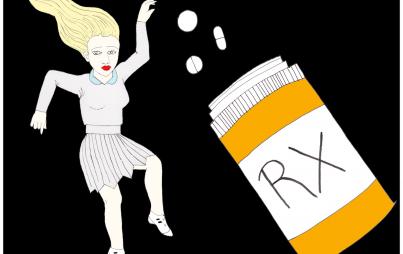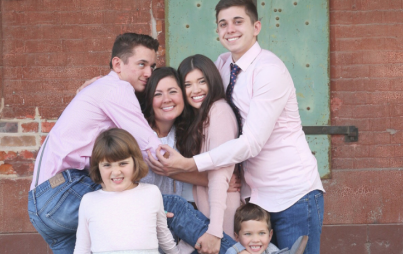
BDSM and the use of safewords.
The first time I ever used a safeword was in a hotel room with a man I’d met on the Internet.
He’d flown me to this foreign city; met me at the airport. We’d been talking online, via Skype and the phone, for months. He was my Dominant.
I was new to BDSM and had never had a physical encounter with someone who identified as a Dom before. I’d been reading about it on the Internet obsessively for years. I was incredibly turned on by the idea, yet somehow terrified that once it came down to it, I wouldn’t actually enjoy the pain.
That turned out to be partially true.
It’s the mental aspect that’s always turned me on the most — the mind games, the degradation, the name-calling. I’m much more of a submissive than I am a masochist. So while I can handle a certain amount of sensation when aroused due to the adrenaline coursing through my veins, I don’t generally get off on pain.
And so, during our very first physical encounter, I found myself uttering the safeword we had been so careful to choose before we ever even met.
Iguana.
And everything stopped. I truly was safe.
♦♦♦
The first time I remember learning what a safeword was, I was sitting in my college dorm, devouring blogs about kink and BDSM. It all seemed so foreign to me, a teenager who couldn’t imagine real people doing any of the taboo things these blogs talked about.
I didn’t yet understand why I was so drawn to this world of consensual rape re-enactments and a loss of control that people agreed to, maybe even desired.
I was intrigued for sure, but didn’t dare to seek out anyone locally to explore it with. Instead, I read and I lurked and I learned.
I learned about safewords, the word that gives the submissive in a situation the power to stop it altogether, at any time and for any reason, just by uttering that word.
I learned that it was absolutely imperative that there be a safeword negotiated between all partners before any play takes place in a BDSM context.
Safewords were non-negotiable.
♦♦♦
The first time my therapist brought up the concept of having a safeword, I bristled.
I’d long since left the BDSM scene, after recognizing that I was not using it in a healthy way. In fact, I felt embarrassed and ashamed at some of the things I’d consented to try in an effort to fill a void I felt deep in my soul, in an effort to gain control of a life that was so quickly spinning out by giving control over to someone else.
I’d pushed my boundaries to places I couldn’t even bring myself to think about. Finding forgiveness for people who had raped and assaulted me turned out to be relatively easy in comparison to finding the ability to forgive myself for the things I’d allowed to happen to me in the context of BDSM.
Any reminder or suggestion of tools I’d learned from my time in a BDSM relationship was something I was absolutely not interested in.
That was part of my past that I hoped to keep there.
♦♦♦
Safety: noun
-
the condition of being protected from or unlikely to cause danger, risk, or injury.
-
denoting something designed to prevent injury or damage.
♦♦♦
The first time I remember feeling out-of-control during sex, I was a teenager and desperately wanted this boy to think I knew what I was doing, that I was experienced, that I was sexy, that I was worthy.
He did things I wasn’t ready for and it all moved way too fast.
It wasn’t supposed to be like this.
Was it?
♦♦♦
The first time I was raped, I woke up in a dark room that didn’t belong to me with my pants at my knees, my boyfriend’s friend’s fingers inside me.
I ran out of the room with my head spinning. It would take years for me to process what had happened, but only days for my brain to start trying to regain control over my body and my life.
What resulted was a complete and total loss of any semblance of control I might have had.
♦♦♦
The second time I was raped, I’d gone over to my ex-boyfriend’s house to hook up with him. It started consensually but ended with him pinning me down and telling me that we’d be having anal sex whether I wanted to or not, while I begged him to stop.
I said, “No.”
I said, “Stop.”
It turns out that no and stop are not safewords.
♦♦♦
The third time I was raped, I don’t actually remember much. I know I was in an apartment. I don’t know how I got there.
I remember getting in a cab and calling my boyfriend to tell him I’d been raped. I couldn’t tell him anything else.
When did my life spiral so completely out of my control?
♦♦♦
My therapist brings up safewords again.
“What happens when you attempt to be intimate with someone?” she asks me.
“I dissociate.”
“Why do you think you do that?”
“Because I’m afraid that it will go somewhere I don’t want it to and I won’t be able to stop it. I don’t know if it will be safe, because people I trusted have violated me before. So I go away so I won’t have to be there if I don’t like what’s happening.”
She looks at me. “Is there ever a time you had a partner you trusted and you had the ability to stop the situation as soon as you felt uncomfortable?” She already knows the answer.
Iguana.
♦♦♦
We choose a safeword.
This is not BDSM. This is trauma recovery.
He is careful, hesitant, and conscientious. He is gentle. He wants me to feel safe. I just want to be present.
Things are OK. I am OK. Suddenly, I am not.
I feel myself dissociate. I feel myself shutting down. Instead of leaving my body and sitting among the clouds, I say it.
Orange.
Everything stops. I truly am safe.
This is control.
This is safety.
This is healing.







